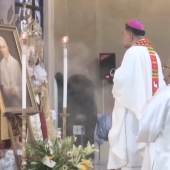Pope Francis’ Environmental Legacy Lives On

Pope Francis's passing coincides with the 10th anniversary of Laudato Si’, his groundbreaking encyclical that redefined Catholic environmental teaching in the context of today’s ecological crisis.
His vision and leadership turned the Catholic Church into a leading force for ecological action, influencing not just the faithful but global policies and interfaith collaborations.
Released in May 2015, before the Paris Climate Agreement negotiations, Laudato Si’ played a pivotal role in ensuring that the landmark accord included the crucial 1.5°C temperature threshold. Pope Francis’s diplomatic efforts and moral voice gave global momentum to climate ambition, and the Holy See became a party to the agreement.
Under his leadership, the Church launched the Laudato Si’ Action Platform, mobilizing Catholic institutions worldwide to develop ecological action plans that have touched over 20 million people.
Care for creation has since become a central expression of faith, seen especially in the global observances of the ecumenical Season of Creation, Laudato Si’ Week, and the World Day of Prayer for the Care of Creation—all co-sponsored by the Vatican and engaging millions annually.
Beyond Catholic circles, Pope Francis breathed new life into the global faith-based environmental movement.
He inspired countless religious leaders and communities to act. A notable moment came before COP26 in 2021, when he convened 50 religious leaders at the Vatican to issue a historic multi-faith declaration. Among other significant developments was Al Mizan, known as "Muslim Laudato Si”’.
The Laudato Si’ Movement, named by Pope Francis himself, has emerged as a grassroots force operating in 140 countries. It's a documentary featuring Pope Francis and frontline ecological advocates and has been viewed by over 10 million people.
Pope Francis' legacy has reshaped the Church’s understanding of humanity’s relationship with creation and the Creator. Drawing on scripture, tradition, and previous papal teachings, he presented a compelling theological response to the ecological crisis—one that has resonated deeply across faiths and borders.
Catholic Leaders Reflect
Bishop Allwyn D’Silva, chairman of the Office of Human Development, Federation of Asian Bishops’ Conferences, said, “Long before Pope Francis, grassroots activists understood how climate change hurt the poor the most. But it took Pope Francis’s moral and spiritual authority to elevate integral ecology globally. In Laudato Si’, he communicated profound truths without academic jargon—summed up in the powerful phrase, “The cry of the Earth is the cry of the poor’.”
Monsignor Eric de Moulins-Beaufort, President of the French Bishops’ Conference, recalled, “Laudato Si’ was a game-changer. In Paris, just before COP21, it sparked enthusiasm in parishes, drew volunteers, and gave credibility to many emerging initiatives. As auxiliary bishop at the time, I witnessed this awakening firsthand.”
Bishop Serverus Jjumba, Diocese of Masaka, Uganda, emphasized, “For the first time in Church history, Pope Francis consolidated environmental stewardship into a single, high-level document with global relevance. By presenting it as an encyclical and addressing all peoples and cultures, he invited the world into a shared moral conversation on climate.”
Bishop John Keenan, President of the Catholic Bishops’ Conference of Scotland, reflected:
“Pope Francis' life was marked by humility, simplicity, and a powerful witness to God’s love and mercy. He was a voice for the voiceless, a man of peace, and a champion of care for creation—God’s precious gift to humanity.”
Reflections from Laudato Si’ Movement
Dr. Lorna Gold, Executive Director of the Laudato Si’ Movement, shared, “As our spiritual shepherd, Pope Francis inspired us to dream again. His humility and deep commitment to the common good gave our movement direction and purpose. That he passed during Easter—a season of renewal—reminds us to be grateful for the gift of his life and leadership.”
Tomás Insua, Founding Executive Director, said, “As the first pope from the Global South, he brought global solidarity to Rome. His identity as Francis of Assisi’s namesake gave him the moral clarity to proclaim, "The cry of the Earth and the cry of the poor’ are one. As we approach the 10th anniversary of Laudato Si’, let us honor his legacy with renewed action to heal our common home.”
Climate and Environmental Leaders React
Mark Campanale, founder of Carbon Tracker, said, “Pope Francis sparked a movement beyond the Catholic Church. His moral vision planted seeds for a just energy transition that will grow for years to come.”
Tzeporah Berman, Chair of the Fossil Fuel Nonproliferation Treaty, remarked, “While governments hesitated, Pope Francis spoke boldly. His voice made clear that climate action is a moral imperative.”
Bill McKibben, founder of 350.org, noted, “He understood the promise of solar energy—science and scripture united in a vision of hope. Under his guidance, Vatican City moves toward being the first nation powered entirely by the sun.”
Mary Robinson, former president of Ireland, said, “Pope Francis' moral leadership on climate justice was unmatched. He reminded us that the climate crisis is not just environmental—it’s about justice, compassion, and the fate of future generations.” - With inputs from Reba Elliott and Cheryl Dugan
Radio Veritas Asia (RVA), a media platform of the Catholic Church, aims to share Christ. RVA started in 1969 as a continental Catholic radio station to serve Asian countries in their respective local language, thus earning the tag “the Voice of Asian Christianity.” Responding to the emerging context, RVA embraced media platforms to connect with the global Asian audience via its 21 language websites and various social media platforms.













